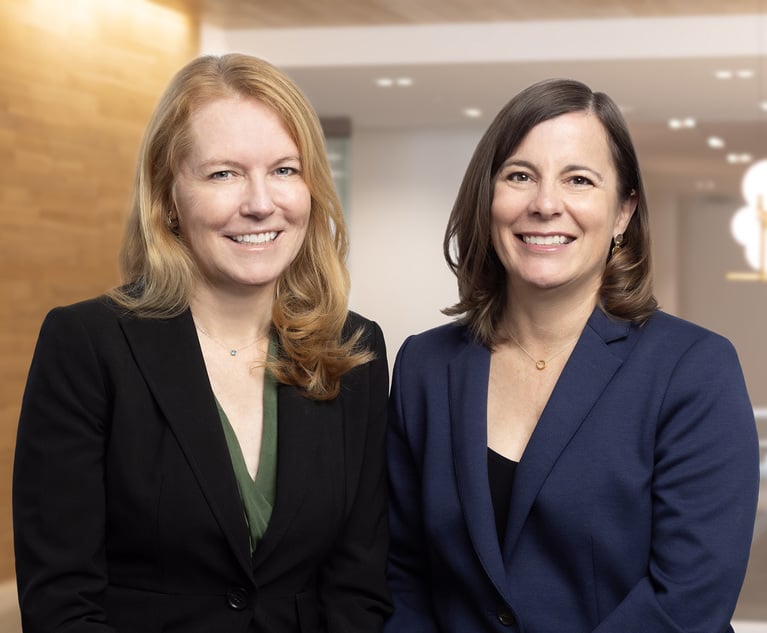Judge Asks Feds to Probe $400K in Fraudulent Claims in App Privacy Settlement
U.S. District Judge Jon Tigar asked federal prosecutors to investigate nearly 6,000 potentially bogus claims submitted in a $5.3 million settlement with app makers, including Twitter, Instagram and Yelp.
January 17, 2018 at 05:14 PM
3 minute read

A federal judge in San Francisco has flagged fraudulent claims filed in a privacy class action for investigation by the local U.S. Attorney's Office.
U.S. District Judge Jon Tigar of the Northern District of California took the extraordinary move of referring the case to local federal prosecutors after the claims administrator managing the $5.3 million settlement identified nearly 6,000 potentially bogus claims. Plaintiffs counsel in the case said the fraudulent claims could have siphoned away about $400,000 from legitimate class members.
In Tuesday's order, Tigar said he took no position on whether prosecutors should bring charges or not.
The underlying case, Opperman v. Kong Technologies, dates back to 2013. Plaintiffs targeted Apple Inc. and a group of app makers claiming that app makers violated users' privacy by accessing the contact information stored on their Apple devices. Apple beat back the plaintiffs' bid for class certification late last year after the app makers, including Twitter Inc., Instagram LLC and Yelp Inc., previously agreed to settle.
The lead plaintiffs lawyers on the case at Phillips, Erlewine, Given & Carlin and Kerr & Wagstaffe asked Tigar in November how to proceed after the administrator handling the claims process, KCC Class Action Services LLC, identified 5,924 claims that it suspected weren't submitted by class members. None of the identified claims used unique claim numbers provided in email notices that were sent out to potential class members. In addition, numerous claims had different physical addresses but came from identical IP addresses.
Todd Hilsee, a class action consultant with The Hilsee Group LLC who was not involved in the case, said that the case provides “a window into a practice that is more common now with electronic claims.”
“This is one of the undesirable or unintended consequences of electronic claims filing and electronic notice,” Hilsee said.
Tigar asked KCC to email the flagged claimants to ask for proof of identity and asked the administrator to report back after allowing a week for claimants to respond. Tellingly, KCC only received two responses and determined that neither of the underlying claims was actually submitted by a class member.
Kerr & Wagstaffe's Michael von Loewenfeldt, one of the lead attorneys on the case, said that KCC's screening meant that $400,000 in potential claims would be paid out to class members rather than fraudsters.
“Unfortunately, if you have an open claims process people will try to take advantage of it—and not very skillfully it turns out,” von Loewenfeldt said.
This content has been archived. It is available through our partners, LexisNexis® and Bloomberg Law.
To view this content, please continue to their sites.
Not a Lexis Subscriber?
Subscribe Now
Not a Bloomberg Law Subscriber?
Subscribe Now
NOT FOR REPRINT
© 2025 ALM Global, LLC, All Rights Reserved. Request academic re-use from www.copyright.com. All other uses, submit a request to [email protected]. For more information visit Asset & Logo Licensing.
You Might Like
View All
Farella Elevates First Female Firmwide Managing Partners

'Nerve-Wracking': Fires Disrupting but Not Halting Work of Distributed Firms' LA Lawyers
3 minute read
Miami Judge Approves Shaq's $11 Million Settlement to Resolve Astrals Investor Claims
3 minute read
Crypto Exchange’s ‘Meteoric Rise’ Leads to Nationwide Class Action Trend
4 minute readTrending Stories
- 1Courts Grapple With The Corporate Transparency Act
- 2FTC Chair Lina Khan Sues John Deere Over 'Right to Repair,' Infuriates Successor
- 3‘Facebook’s Descent Into Toxic Masculinity’ Prompts Stanford Professor to Drop Meta as Client
- 4Pa. Superior Court: Sorority's Interview Notes Not Shielded From Discovery in Lawsuit Over Student's Death
- 5Kraken’s Chief Legal Officer Exits, Eyes Role in Trump Administration
Who Got The Work
J. Brugh Lower of Gibbons has entered an appearance for industrial equipment supplier Devco Corporation in a pending trademark infringement lawsuit. The suit, accusing the defendant of selling knock-off Graco products, was filed Dec. 18 in New Jersey District Court by Rivkin Radler on behalf of Graco Inc. and Graco Minnesota. The case, assigned to U.S. District Judge Zahid N. Quraishi, is 3:24-cv-11294, Graco Inc. et al v. Devco Corporation.
Who Got The Work
Rebecca Maller-Stein and Kent A. Yalowitz of Arnold & Porter Kaye Scholer have entered their appearances for Hanaco Venture Capital and its executives, Lior Prosor and David Frankel, in a pending securities lawsuit. The action, filed on Dec. 24 in New York Southern District Court by Zell, Aron & Co. on behalf of Goldeneye Advisors, accuses the defendants of negligently and fraudulently managing the plaintiff's $1 million investment. The case, assigned to U.S. District Judge Vernon S. Broderick, is 1:24-cv-09918, Goldeneye Advisors, LLC v. Hanaco Venture Capital, Ltd. et al.
Who Got The Work
Attorneys from A&O Shearman has stepped in as defense counsel for Toronto-Dominion Bank and other defendants in a pending securities class action. The suit, filed Dec. 11 in New York Southern District Court by Bleichmar Fonti & Auld, accuses the defendants of concealing the bank's 'pervasive' deficiencies in regards to its compliance with the Bank Secrecy Act and the quality of its anti-money laundering controls. The case, assigned to U.S. District Judge Arun Subramanian, is 1:24-cv-09445, Gonzalez v. The Toronto-Dominion Bank et al.
Who Got The Work
Crown Castle International, a Pennsylvania company providing shared communications infrastructure, has turned to Luke D. Wolf of Gordon Rees Scully Mansukhani to fend off a pending breach-of-contract lawsuit. The court action, filed Nov. 25 in Michigan Eastern District Court by Hooper Hathaway PC on behalf of The Town Residences LLC, accuses Crown Castle of failing to transfer approximately $30,000 in utility payments from T-Mobile in breach of a roof-top lease and assignment agreement. The case, assigned to U.S. District Judge Susan K. Declercq, is 2:24-cv-13131, The Town Residences LLC v. T-Mobile US, Inc. et al.
Who Got The Work
Wilfred P. Coronato and Daniel M. Schwartz of McCarter & English have stepped in as defense counsel to Electrolux Home Products Inc. in a pending product liability lawsuit. The court action, filed Nov. 26 in New York Eastern District Court by Poulos Lopiccolo PC and Nagel Rice LLP on behalf of David Stern, alleges that the defendant's refrigerators’ drawers and shelving repeatedly break and fall apart within months after purchase. The case, assigned to U.S. District Judge Joan M. Azrack, is 2:24-cv-08204, Stern v. Electrolux Home Products, Inc.
Featured Firms
Law Offices of Gary Martin Hays & Associates, P.C.
(470) 294-1674
Law Offices of Mark E. Salomone
(857) 444-6468
Smith & Hassler
(713) 739-1250






